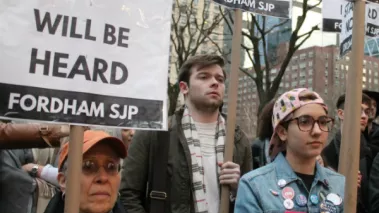Table of Contents
Fordham objects to new student joining lawsuit over rejected Students for Justice in Palestine chapter

Members and supporters of Fordham Students for Justice in Palestine rallied in 2017 on the university's Manhattan campus to protest the Fordham administration's refusal to register SJP as a student organization. (Joe Catron / Flickr.com)
Over two years after Fordham University refused to recognize a prospective chapter of Students for Justice in Palestine on the basis of its political beliefs, a group of students continues to fight the school’s decision in court. But over a year after asking a Manhattan judge to order Fordham to recognize the chapter, three of four student petitioners have graduated awaiting the court’s decision, with the final petitioner set to graduate in May.
In February, a new generation of Fordham student sought to join the lawsuit. Petitioners moved to amend their complaint to add to the case sophomore Veer Shetty, who wishes to join a recognized SJP chapter at the university. Shetty’s addition to the suit would help keep it alive once all current petitioners have graduated, preserving the chance for current and future students to have a chapter, even if the original applicants never enjoy the benefit of their fight.
In a March filing, however, Fordham opposed the move to bring Shetty into the case, likely aware of its chance to let the slow-turning wheels of justice render the lawsuit moot if the sophomore is blocked from joining.
The university denied SJP’s application to become a recognized student organization in December 2016, after it was initially approved by the student government. Despite that decision, Dean of Students Keith Eldredge refused recognition, writing that he “cannot support an organization whose sole purpose is advocating political goals of a specific group, and against a specific country.” He stated that “the Israeli-Palestinian conflict … often leads to polarization rather than dialogue” and specifically cited the group’s support for the Boycott, Divestment, and Sanctions of Israel campaign as “a barrier to open dialogue and mutual learning and understanding.”
At a public university, the institution’s rejection of SJP on these grounds would be an obvious First Amendment violation, as well-worn jurisprudence bars a university from denying recognition to student groups because it disfavors their message or mission. Although Fordham is a private institution, and not bound by the First Amendment, it makes multiple public promises that its students will enjoy freedom of expression, proclaiming that the “expression of controversial ideas and differing views is a vital part of University discourse.”
The students’ lawsuit argues that these promises, codified in Fordham’s policies, are binding on the university. By failing to follow its own rules, they argue, the school violated state law and must be ordered to reverse its ban on the SJP chapter.
Despite the school’s outward embrace of free speech principles, Fordham’s recent opposition to Shetty’s petition to join the lawsuit appears to double down on its viewpoint-based justifications for denying SJP recognition. The school argues that Shetty and the petitioners are free to have “debate and discourse concerning Palestinian-Israeli issues,” just not under “the moniker of their choosing.” It argues that Shetty should be barred from the case because its rejection of SJP doesn’t prevent him from starting his own club, “particularly if he presents his application and club constitution in such a way that it addresses the University’s concerns with Petitioners’ 2015 application and constitution.”
As petitioners point out in their reply to Fordham’s opposition, the university’s argument that Shetty “can simply submit an application for a different club that it might approve entirely misses the point … . Mr. Shetty, like Petitioners before him, wants to be a member of a group called Students for Justice in Palestine, which is what Fordham refuses to permit.” Indeed, the petitioner students’ desire to convey a specific political message through affiliation with a particular movement — and Fordham’s concomitant suppression of that message — is the very heart of the lawsuit.
It seems nothing has changed since Fordham’s brazen censorship of SJP earned it a spot on FIRE’s 2017 list of America’s 10 worst schools for free speech. We’ll continue to follow petitioners’ long-running court battle and hope to report that justice delayed does not become justice denied for the next generation of Fordham students hoping to join a recognized SJP chapter.
Recent Articles
FIRE’s award-winning Newsdesk covers the free speech news you need to stay informed.

No president gets to decide who deserves a lawyer

Free speech in an age of fear: The new system loyalty oaths – First Amendment News 464

AI is new — the laws that govern it don’t have to be
